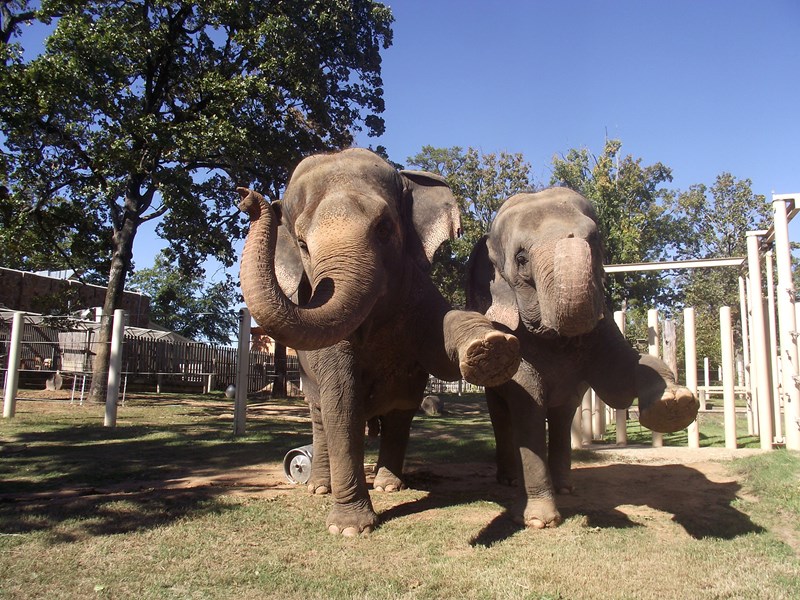
LITTLE ROCK (August 1, 2024) -Today, we’re taking you behind the scenes to explore a day in the life of our magnificent elephants. These animals receive extraordinary care every day, ensuring their health, happiness, and well-being.
The Little Rock Zoo boasts a rich history of caring for older elephants, earning a distinguished reputation as experts in geriatric elephant care. Over the years, we have nurtured a remarkable collection of Asian elephants, including beloved individuals such as Ruth and Ellen. Currently, the Zoo is home to three cherished members of our elephant family: Zina, Babe, and Sophie.
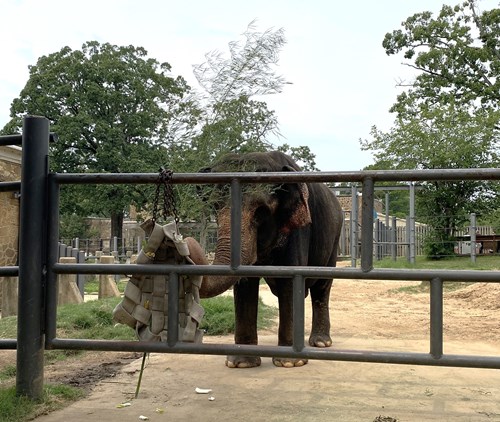
A Day in the Life of the Little Rock Zoo Elephants
The elephant’s mornings start early, as their keepers arrive and begin their daily checks. Upon arriving, the keeper staff will check on each of the elephants to ensure they are all healthy and everything is looking in order. Once it’s confirmed that everyone is doing well, the elephants are brought into their barn so that keepers can clean their habitat from the night before. After getting everything cleaned up, keepers engage the elephants in a 30-minute exercise session to keep them active and healthy. Following their work out, it’s bath time, where keepers will thoroughly clean each elephant before serving them a nutritious breakfast. Any necessary medical treatments are administered during this time as well.
Once their morning routine is completed, elephant keepers will set up enrichment activities and scatter food around their habitat before giving the elephants access to their outdoor yards for the remainder of the day. Keepers then hose down the barn and get it set up for the night. This routine usually takes until lunchtime.
In the afternoon, the elephant keepers will work on various projects and conduct training sessions with the elephants. Later in the day, Sophie is brought inside the barn for her exercise session and any medical treatments she may need. Next Babe and Zina are brought in, while the elephants enjoy their dinner the keepers will head back out into the yards to clean them again and set everything up for the night. Once everything is done, the elephants are given access to both the yards and the barn, allowing them to move freely between the two areas throughout the night as they choose.
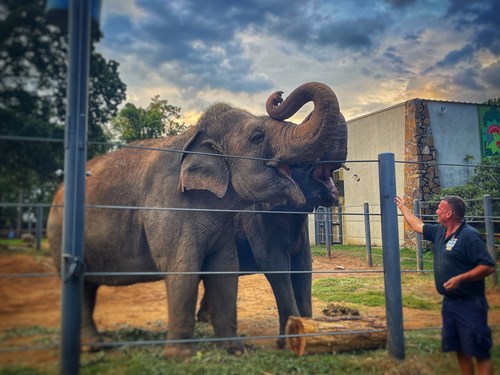
Feeding Schedule
Each elephant receives a customized breakfast bowl tailored to their individual dietary needs. The bowls contain bran, with two of the elephants also receiving grain, while the third gets lettuce instead. Throughout the day, the elephants are free-fed hay in hay nets or other enrichment toys, ensuring they have as much as they want. Elephant keepers also provide various types of produce for training and enrichment, and fresh browse (freshly cut tree limbs) is available throughout the day and night. At night, they receive four bales of hay, enough to last them until morning. This constant feeding is necessary because elephants only digest about 40% of what they eat due to their inefficient digestive systems.
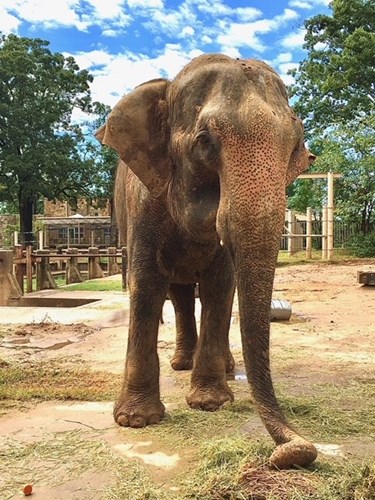
Enrichment
To keep the elephants engaged and mentally stimulated, their keepers create a variety of enrichment toys from different materials. Firehose is a favorite due to its durability; it’s weaved into nets and various shapes where treats can be stuffed inside. Keepers will repurpose old barrels and tires as feeders, while metal beer kegs can be used as giant “Kong” treats filled with produce. High poles around the elephant habitat allow keepers to hang these toys, encouraging the elephants to reach for them. Additionally, produce is scattered throughout their yards, different scents are used for the elephants to explore, and large logs are changed out often so that the elephants can strip the bark. Elephant keepers also maintain a wallow in the habitat, providing the elephants with a space to cool off. In the summer they’re also given access to a pool and sprinklers.
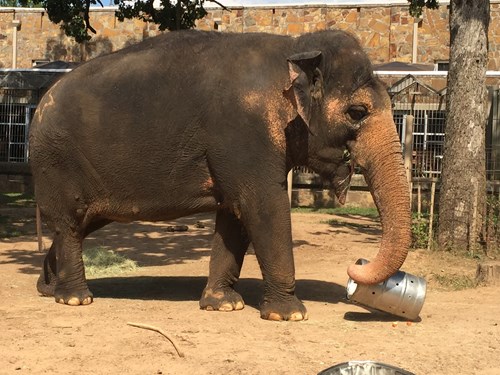
Health Care
Daily health checks are a crucial part of the elephants’ routine. If keepers notice anything unusual, they immediately call veterinary staff so that the problem can be addressed. In addition to these daily checks, each elephant receives an annual physical and vaccinations. Each elephant has monthly blood work performed with Sophie having blood drawn every week, and each elephant is weighed every other month to monitor their health. The elephants receive regular foot care every few weeks to ensure that their feet and nails remain in good condition. Each elephant has personalized medical therapies and exercise routines, which is particularly important for these elephants to help manage arthritis and maintain their mobility.
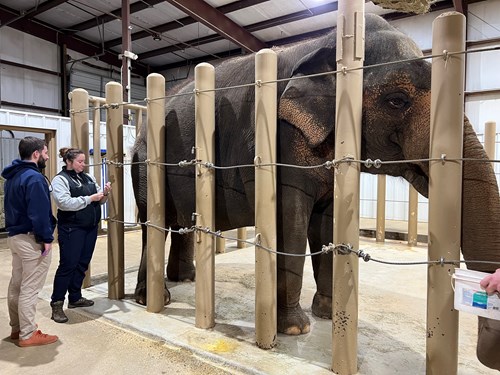
Training
Training plays a vital role in the elephants’ care, allowing them to voluntarily participate in their health routines. Each elephant is trained to present their body parts for close inspection, lift their feet for foot care, present their ears for blood collection, and lie on their sides for full-body access. This voluntary cooperation reduces stress during veterinary procedures. Beyond medical training, the elephants also learn various exercises to keep them fit. They enjoy walks, lifting and stretching exercises, and fun activities like painting. Babe can even play the harmonica!
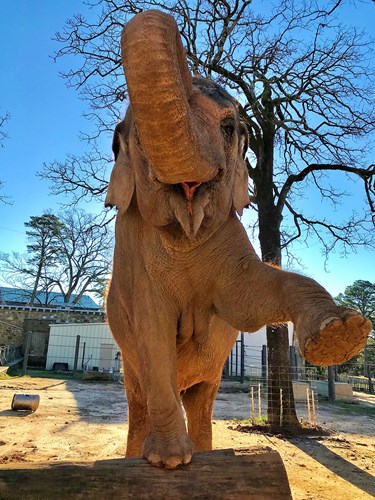
Ensuring Well-being
Specializing in geriatric elephant care, our animal care staff focus on the unique needs of older female Asian elephants. Our comprehensive program includes tailored exercise routines, specialized diets, and medical treatments. The elephants’ habitat features hills to assist with getting up, mud wallows, a pool, and various enrichment activities to keep them mentally and physically engaged. Our full-time veterinarians provide round-the-clock medical care, and our exhibit design encourages natural behaviors, ensuring the elephants lead fulfilling lives.
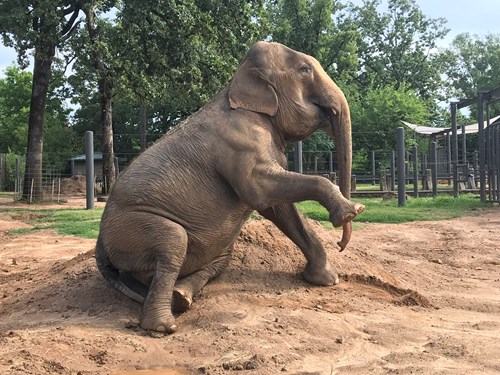
Committed to Excellence: The Heart of Our Care
At the Little Rock Zoo, we are deeply committed to providing the highest standard of care for our elephants. Our team of skilled animal care staff and veterinarians work tirelessly to ensure they lead happy and healthy lives. Our commitment to geriatric elephant care exemplifies our dedication to exemplary animal welfare standards. Through expert veterinary care, proactive preventative measures, and compassionate treatment plans, we ensure our golden girls enjoy their lives to the fullest. As stewards of these magnificent creatures, we remain steadfast in our mission to uphold the highest standards of elephant welfare and conservation.
We invite you to visit the Little Rock Zoo and witness the extraordinary care our elephants receive firsthand. Your visit supports our ongoing efforts in wildlife conservation and education. Together, we can make a difference for elephants and other wildlife around the world.
Photo Credits: Conservation and Research Coordinator Dr. Laura Bernstein-Kurtycz PhD, Andrew Spillers, & Elephant Keepers
Posted by Misty Waddle & Kristin Grove on 01 Aug 2024
About the author
Misty Waddle & Kristin Grove
This post was written by Misty Waddle with contributions from Kristin Grove. Misty Waddle is the Guest Services & Marketing Coordinator at the Little Rock Zoo. Kristin Grove is the Elephant Manager at the Little Rock Zoo, overseeing the care and well-being of all the elephants at the Zoo.



